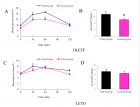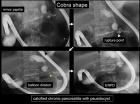Table of Contents
Return to Driving in Mild Traumatic Brain Injury: Evaluation of Coping Strategies, Resilience, and Psychological Distress
Published on: 3rd July, 2025
Background: This study explored whether emotional distress, coping, and/or resilience contributed to return to driving (RTD) following experienced mild traumatic brain injury, and whether these variables of interest differed among those who had and had not RTD. Methods: The present study evaluated de-identified archival data of 65 patients with mTBI following an MVA. Patients were either the driver, passenger, /or pedestrian struck by a motor vehicle, and aged 22 to 69 years. The sample consisted of 36 men and 29 women with an average education. The mean months elapsed between the accident and the assessment was 16.82 months. Pearson correlations were used to test for associations between all explanatory and outcome variables. Separate linear and hierarchical regressions were carried out to evaluate whether variables of interest were significant predictors of RTD. Results: Findings revealed that the presence of depressive symptoms was associated with coping, irrespective of style, resilience, driving-related anxiety, and RTD. Moreover, RTD was related to driving-related anxiety, too, and in fact, anxiety (considering the presence of depressive symptoms) appeared to be an even greater limiting factor when considering RTD in this population. Age, gender, and education did not influence RTD. Conclusion: The present study revealed that depressive symptoms and driving-related anxiety in particular contribute to whether patients with mTBI RTD, irrespective of time since injury, age, and gender. Coping styles and resilience did not predict RTD. Further work is warranted to address the paucity of research investigating RTD parameters that contribute to and/or hinder RTD among mTBI sufferers.
Climate Change and the Untold Story of Ecoanxiety
Published on: 24th July, 2025
Anthropogenic activity has escalated the planet’s temperature and resulted in dire consequences on our environment, and our health, whether physical or mental. The imbalance created in the planet’s environmental conditions has consequently caused a rupture in mental health, and ecoanxiety has become one of the adverse indirect repercussions. Not quite recently, a sense of urgency has been spreading in the literature of climate change, evoking a call for action, and requesting commitment from us all: individuals, communities, and countries. This paper attempts to establish a link between the climate crisis and ecoanxiety in the aim to restore our cognition of our roles to save the planet, salvage our health and preserve, and conserve, environmental resources for future generations.
Investigating the Effect of the Family-Centered Empowerment Model (FCEM) on the Empowerment Indicators of Student Girls with Iron Deficiency Anemia (IDA) and Their Mothers
Published on: 27th August, 2025
Background and aims: Iron deficiency is one of the most important health issues in adolescents, especially girls. Today, empowerment is considered an effective program to change behavior in chronic disease control. This study was conducted to determine the effect of the family-centered empowerment model on the empowerment indicators of student girls with iron deficiency anemia and their mothers.Methods: This is a two-group semi-experimental study conducted on 60 student girls along with their mothers, who were selected by a two-stage cluster random sampling method. Data was collected using a demographic information questionnaire and an adolescent and mother empowerment questionnaire. The intervention based on the family-centered empowerment model was implemented for the test group, and after 1.5 months, data from both groups were collected and analyzed with chi-square, independent t, and paired t-tests.Results: The results of the independent t-test showed that there was a significant difference between the student girls in the test and control groups after the intervention in terms of empowerment indicators (p < 0.05). The results of the independent t-test showed that there was a significant difference between the mothers in the test and control groups after the intervention in terms of ability indicators (p < 0.05), while before the intervention, this difference was not significant (p > 0.05). Conclusion: The results of the present study showed that the implementation of the family-centered empowerment model not only increased the empowerment indicators of student girls with iron deficiency anemia but also had an effect on the empowerment of their mothers.
Optimizing Treatment of Depression, Trauma, and Anxiety Disorders through Neurophysiological Interventions
Published on: 15th October, 2025
Depression, trauma, and anxiety disorders continue to be predominant causes of global disability, with typical therapies proving to be only marginally successful. Heart Rate Variability Biofeedback (HRVB) offers patients a self-regulation method that improves the flexibility of the autonomic nerve system via resonance breathing. Clinical research shows that training can significantly lower symptoms of sadness and PTSD, with improvements shown after 4 to 8 weeks. HRVB is inexpensive, non-invasive, and scalable, making it a promising supplementary therapy in psychiatry. Subsequent study ought to inform its incorporation into clinical protocols.
Screening for Depressive Symptoms in Clinical and Nonclinical Youth: The Psychometric Properties of the Dutch Children’s Depression Inventory-2 (CDI-2)
Published on: 24th December, 2025
Objective: This study investigated the utility of the second version of the Children’s Depression Inventory (CDI-2) as a screening tool to identify children and adolescents aged 8-21 years suffering from depressive symptoms. Method: Data were collected by combining questionnaire data from multiple clinical and control subsamples in which the CDI-2 child and parent version were administered to clinically depressed children (n = 111), children with other psychiatric disorders (n = 74) and control children (n = 2246) as well as their parents (respectively n = 104, n = 112, n = 2130). Results: Results showed that the CDI-2 has good psychometric properties in terms of internal consistency, factor structure, parent-child agreement, convergent and divergent validity. However, the factor structure of the parent version was insufficient. The CDI-2 total score of the child version and parent version can differentiate between clinically depressed children, children with other psychiatric disorders, and control children. Further, reliable cut-off scores were established. There were also significant gender and age effects.Conclusion: The total score of the CDI-2 child and parent version can be used as a screening tool to detect clinically significant depressive symptoms in children and adolescents.

If you are already a member of our network and need to keep track of any developments regarding a question you have already submitted, click "take me to my Query."
















































































































































